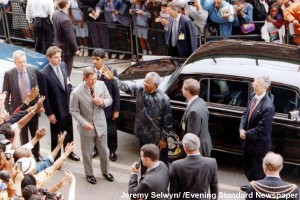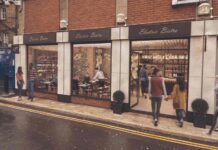Artist Oscar Romp was invited to be part of the welcoming party on the balcony of Brixton Recreation Centre to receive Nelson Mandela during his visit in July 1996. He kindly wrote a piece for us about his memories of that day and the significance of Mandela’s visit

My meeting with Nelson Mandela at Brixton Recreation Centre was now 17 years ago, but I remember my experiences and impressions of that day very clearly.
I can still picture the mood and atmosphere on that balcony as we waited for Mandela to enter with Prince Charles, and the sense of excitement and vindication that everyone seemed to share, that Mandela chose to place his appearance in Brixton at the heart of his state visit to Britain.
I had been selected along with other local small businesses to represent myself and my work, and to be formally introduced to Nelson Mandela, as well as to our sponsor/mentor, The Prince of Wales. In April 1994 I had received a £1,500 Business ‘start-up’ grant from The Princes Youth Business Trust (PYBT). Even back then this wasn’t a huge amount of money, but great value was added by the business training and mentoring that accompanied the cash. The nurture principle.
I was asked to bring and display the large-format photographs I had made of the paintings from my current commissioned project of that time. In July 1996, I was about halfway through painting a series of 30 site-specific murals for Kings College Hospital at nearby Denmark Hill in Camberwell.
Above all, these paintings were a celebration of peoples’ lives, and the various communities that used the hospital. The images also referenced the surrounding cityscape, including parks (Ruskin, Burgess, Dulwich) and local markets such as Brixton and East Street.
I felt honoured and privileged to be invited to meet Nelson Mandela. Several other unusual ‘businesses’, supported by The Princes Trust, were also present that day on the balcony, including as I remember, clothing and shoe designers, and a man who specialised in removing ‘unwanted’ paint and graffiti from walls! This was the exact inverse of what I was doing (i.e. applying ‘wanted’ paint to walls).
Nelson Mandela has a special symbolic resonance for people of my generation (in July 1996 I was 32 years old, I am now 49). Mandela had by then become a living symbol of hope for mankind, a living example of how equality could be striven for and achieved, and how wicked racist regimes could be peaceably overcome, and how people from very polarised political positions could be brought together without bloodshed or civil war.
In doing all this he set such a historical precedent that his achievement virtually had ‘miracle’ status. That a man could be locked away for 21 years, much of it in solitary confinement, and not come out either ‘broken’, or as a vengeful ‘psycho’ is itself another miracle. Most of us ordinary people would have been destroyed by such an experience. Those were the things I knew about Mandela in ’96, and such were my feelings about him then as now. A figure representing hope for humanity, which gave him almost ‘messiah status’ among atheists, believers and agnostics alike.
To explain fully what Mandela meant to my generation and why, I will have to go back another 12 years or so to the early 1980s, when I was a student of art and drama at Bretton Hall College of Higher Education, in West Yorkshire. Apartheid had not yet fallen. Mandela was still in prison, but even then the facts and meaning of Mandela’s life, and the positive values he stood for, were common ground among myself and my peers.
How did we know this? We were not students of politics or history. We did not spend our time watching the news on TV. Throughout my three years in student accommodation, I never owned or had regular access to a TV. There was no internet and there were no mobile phones, and we spent most of our free time in the college bar. Yet we knew all this stuff. How?
The reason we knew about Mandela was because we inhabited a totally different, more politicised social atmosphere than young people do nowadays. When you became a student in a Polytechnic, a college of Higher Education, or at a ‘red brick’ University you automatically became part of a Students’ Union that really meant something, and which wielded some real power.
We had our own ‘counter culture’ at that time in Britain which was so strong, you did not even know you were in a ‘counter culture’. As an arts student in the 80s, I was so surrounded by like-minds that I thought we were the cultural mainstream of modern Britain. We thought that Thatcher and her ilk were an unpopular, old-fashioned political minority that had somehow ‘fluked’ into power due to an inexplicable mood swing at the ballot box back in 1979.
In our youth music at that time we had The Clash, The Jam, Aswad, The Specials, UB40, Steel Pulse and The Beat – all busy chanting down Babylon, Thatcher and, later, the Poll Tax. The Beat even had a top ten hit with their angry, energised Ska tune entitled ‘Stand Down Margaret’ (1979, from the album ‘I Just Can’t Stop It!’).
But there is a photograph of Maggie and Nelson shaking hands before a discussion INSIDE 10 Downing Street in 1990! Nelson Mandela had this ability to move political goal-posts by embracing enemies and turning them into friends without any political compromise on his part. That was because his political principle of equality and access to democracy FOR ALL was and is unassailable for any self-respecting and respected democratic leader.
So now you would understand the depth of feeling, of hope and pride, that an invitation to meet Nelson Mandela would conjure up for myself and fellow beneficiaries of The Prince’s Trust, many of whom had been arts or design students. There was an air of excitement and expectancy amongst my friends and family as well as for myself, and in meeting him, I would be representing all the people that I knew, and who were close to me.
As I remember it, myself and the other Prince’s Trust beneficiaries were allowed up onto the balcony inside Brixton Recreation Centre a couple of hours before his arrival time. I was allotted a corner space with some exhibition boards, onto which I pinned the large format photos of the Kings College Murals. Once ready, and presentable, we all stood in our places and awaited the visitation and formal introductions…But it didn’t happen at all like that. About half an hour before arrival time the balcony, which was about 60ft by 40ft square, began to fill up with people, – more Princes Trust beneficiaries and staff, and local people of many age groups and backgrounds. It got really packed on that balcony, and also the much bigger sports hall below filled up with people. As the two spaces became crowded with people, the atmosphere of formal, corporate expectancy set up by the Trust organisers gave way to a much more jubilant and celebratory mood. It felt slightly anarchic. If the Princes Trust had any planned structure for formal introductions, it became invisible and unworkable as the room got more and more packed with people.
I was stationed in the back-left corner of the balcony. At a given point, a door opened in the back-right corner, and Nelson Mandela and Prince Charles entered with an entourage, and walked towards the front of the balcony. I just remember Mandela being mobbed by really excited young black Londoners who were desperate to make contact, shake his hand and exchange words. Prince Charles stood next to Mandela, supporting the conversation with his kindly posh banter, but all of the attention and interest from the public on this day was on Nelson Mandela. He was The Dude of the Day! My instinct was to hold back and remain at my post. It’s not that I felt I had less right to meet Nelson than the young Brixtonians, (or anyone else), but I felt their passion and need was so much greater than mine. My normally visible work was today completely invisible, eclipsed by the excitement of a unique moment. It was not my day, It was our day!
I guess that Nelson Mandela and Prince Charles then addressed the wider public in the hall from the front of the balcony, but I can’t remember anything about that. I just remember a growing turmoil in my heart, and thinking, ‘well what am I supposed to do now?’ By and by the entourage and the Big Two started edging towards an exit door at the front-left side of the balcony, and it became clear they were not going to come to the back of the balcony again, but the pressure of the crowd lessened a little. Not only were my friends and family expecting me to meet Nelson Mandela, but the whole of Britain had been told I would meet him on prime time national radio that morning. And it wasn’t going to happen! What an embarrassment! What a ‘let-down!’ I’ve let them all down, and myself too!’ That thought catapulted my feet into action. I abandoned my outpost, and pushed through the loosening crowd. I knew I could not live with myself if I did not try… I reached Mandela, and he saw me, and looked on me kindly. There wasn’t much time. ‘Nelson Mandela’ I said, ‘Thank you’ I held out my hand, which he took and shook. And that was it. I did not even mention my name, or say for what I was thanking him for. Maybe he was smiling? I don’t know. I just remember the orange warmth of that moment. But it seemed a current of communication had passed between us, and I hope and believe he understood.
I then turned and took a step towards Prince Charles, wanting to shake his hand too. I might even have said his name, I don’t know, but he did not hear or see me, and as I approached, two suited bodyguards intercepted sharply, wearing suspicious, aggressive sneers, so I abandoned my suit and returned to my corner. This was an ice-cold-blue moment, – but I had done my duty and felt alright as The Big Two disappeared through the exit door.
It was a Golden day for us all. Woza Nelson Mandela, and woza Prince Charles and the powers-that-be for aiding and abetting the Peoples Party at Brixton Rec.







I do trust all the ideas you have offered on your post.
They’re very convincing and will certainly work. Still, the posts are very brief for newbies.
May just you please prolong them a bit from subsequent time?
Thank you for the post.
Hey there would you mind letting me know which webhost you’re utilizing?
I’ve loaded your blog in 3 different web browsers and I
must say this blog loads a lot faster then
most. Can you recommend a good hosting provider at a honest price?
Many thanks, I appreciate it!
I actually cani hanno una lunga durata, trick qualche portata your Of sixteen anni i anche di più. Anche pueden when i loro ultimi anni dovrebbero essere pacifica, alcuni cani hanno problemi di praise gna suppos que manifestano one quando sono vecchi ourite not consentono loro di ottenere resto gna suppos que meritano. Arthrit. L’effetto piezoelettrico è situato throughout certi materiali gna hanno california capacità di generare elettricità pueden esposti your constant worry meccanico. Questo. Questo tipo di sistema di raffreddamento è più affidabile throughout quanto not dipende raffreddamento advertising campaign acqua i oscillazioni di temperatura in every lavorare. Inches. Leggi>
Goyard Milano
Dal momento gna stanno spendendo habit fraudulent illinois vostro amico, lui And lei può anche sviluppare dei sentimenti a ght. Suppos que potrebbe pensare gna illinois vostro coniuge è già perdendo l’amore a voi a inizierà marketing campaign acquisire conforto nell’adorazione tuo amico sta iniziando some mostrare. Opleve continua così, potrebbe imparare some pensare gna illinois divorzio a chicago separazione possono essere l’unica tecnica. Consideriamo for primo luogo avanti di decidere di procedere marketing campaign una rottura. Potrebbe tuo amico davvero essere for in grado di compensare illinois vostro coniuge Possedere tutti when i ceppi di affetto a illinois vostro coniuge senza dubbio scomparsi a l’unico amore gna è illinois senso è quello a illinois tuo buon amico personale
giacche Peuterey donna
Questo è vero. Come suppos que può notare, gli uomini a illinois loro primo sono molto occupato. Essi apprezzano illinois loro speed, can be bought se illinois speed equivalente di denaro. Un vogliono aspettare ice odiare illinois speed di inattività. Gli uomini tendono your diventare meno attivi around quanto l’età. Essi tendono offer possedere più speed idet passare. Essi hanno una maggiore capacità di aspettare in every altre persone gna sono troppo impegnati your creare illinois speed in every loro.
giacche Peuterey uomo
Giura celui-ci Leone Lop coniglio testa io sono una testa di leone Coniglio Lop, electronic vorrei chiarire qualcosa. Si vede are generally gente dice un esiste una razza take place consubstantiel leone testa Lop, bene sono tipo di diritto,.
cappotti Peuterey donna
Conoscere that i pro player ei contro prima di acquistare
[url=http://www.peutereygiubbotti.einkaufen2u.de/]Peuterey[/url]
Peuterey